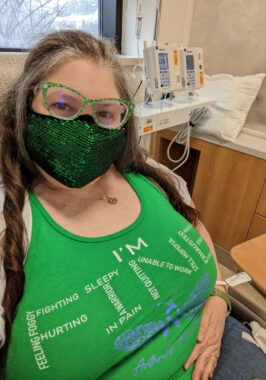Medication side effects prevent me from obtaining important treatment
A columnist works to process her emotions after a frustrating medical roadblock
Written by |

As I stared into my closet this morning, a bright green shirt called out to me. It is St. Patrick’s week, after all, and I knew it would make the two Irish nursing assistants at the infusion center smile.
When I pulled it out of the closet, the design seemed even more fitting. “I’m FINE,” it reads, but “FINE” is really a combination of feelings:
Feeling foggy
In pain
Not quitting
Exhausted
… and so much more.

Kerry gets her infusion, feeling sparkly and F.I.N.E. (Courtesy of Kerry Wong)
When the social worker came around, she commented on my shirt and we talked about the different things that “I’m fine” can mean. One favorite came to mind, from the movie “Scream 2”: “F****d up, insecure, neurotic, and emotional.”
Absolutely perfect, especially after yesterday.
A frustrating roadblock
I met with an orthopedic surgeon to look at my latest X-ray, and he pointed out the differences between my healthy right hip and my arthritic left one. He showed me areas of bone on bone, cysts (fluid-filled sacs that can weaken the bone), osteophytes (bone spurs), and hardening. He called it “end-stage arthritis,” and the only solution is a total hip replacement.
While the procedure could help me, the surgeon explained that he was unable to perform it because of my body mass index.
I fought tears as I drove home, and I unloaded in my aptly timed therapy session that afternoon. I was angry and sad and hurt and insulted and frustrated and scared and definitely not fine, but very much F.I.N.E. It helped to have a healthy outlet to begin processing my emotions right away.
Adding to the frustration is the way I got here. Not that it should matter — we all deserve compassion and care — but I wasn’t always this size. After years of struggle, I finally developed a healthy relationship with food and weight in my mid-20s, and a healthier body and mindset to go along with it. So it’s a twisted and painful irony that my later attempts to improve my health in response to sarcoidosis only made things worse.

Kerry in 2011, just months before her first steroid prescription. (Courtesy of Kerry Wong)
In 2011, I’d known something was wrong for years, but doctors dismissed me because I didn’t look sick (I looked “fine,” even). That summer, I began to develop rashes on my legs and swelling in my hands, feet, and ankles. Finally, my symptoms couldn’t be denied. A new doctor said I had “some kind of arthritis” and ordered prednisone, a corticosteroid, to reduce the inflammation.
For the next several years, my doctors tried to figure out what kind of arthritis I had, and though we changed diagnoses and medications along the way, the steroids remained constant.
By 2015, I had gained 100 pounds and developed myriad other side effects. I told my doctor that I had to stop the prednisone. It was then that she diagnosed my sarcoidosis and prescribed H.P. Acthar Gel (repository corticotropin injection), which stimulates the body’s natural corticosteroid production.
I initially called Acthar my miracle drug, as it worked even better than prednisone to reduce my pain, rashes, and swollen joints, and the side effects developed more gradually. Still, seven years on, Acthar brought more problems, including another 25 pounds.
Admittedly, I share some responsibility for the weight gain, as my diet isn’t perfect. Still, the weight is mostly the result of medications and limited activity due to excessive pain and fatigue. The combination of excess weight and weakened bones from a decade on steroids can easily lead to broken bones and arthritic joints, which can lead to more medications and limited activity, and so on.
It’s pretty common for issues to snowball like this; I know many people with similar stories. That’s exactly why I was able to get the response I needed when I posted about the situation on social media. Friends chimed in with empathy, their own stories, and hurt on my behalf, and recommended I seek a second opinion.
That’s what’s so great about getting involved with the chronic illness community. As much as we need that personal connection and to feel that we’re not alone, we also need practical solutions. From arthritis-friendly product suggestions to chronic illness book recommendations, to doctors who may be better suited to meet our needs, there are some things we can only gain from each other.
With all of these emotions swirling around in my head, today’s T-shirt was an easy choice. Even easier, though, was my decision to wear a matching sequined face mask and glittery eyeglasses, as I was reminded of these famous words:
“Never let anyone dull your sparkle.” — Marilyn Monroe
Note: Sarcoidosis News is strictly a news and information website about the disease. It does not provide medical advice, diagnosis, or treatment. This content is not intended to be a substitute for professional medical advice, diagnosis, or treatment. Always seek the advice of your physician or other qualified health provider with any questions you may have regarding a medical condition. Never disregard professional medical advice or delay in seeking it because of something you have read on this website. The opinions expressed in this column are not those of Sarcoidosis News or its parent company, Bionews, and are intended to spark discussion about issues pertaining to sarcoidosis.







Kathryn Owens
Are there any support groups that you know of in the Elyria. and Cleveland Ohio area?
🦋 Kerry Wong
I'm not 100% sure, but I think they offer one at the Sarcoidosis Center at Cleveland Clinic. You can find there info here, and reach out to them for details.
~🦋
Janet
Is there a sarcoidosis Dr in Winnipeg,manitoba, CANADA ? I have been in remission for 19 years with a lung granuloma but now having lymphatic problems and my specialist has moved into other area’s.
🦋 Kerry Wong
I'm sorry to hear you're having new symptoms, especially when the specialist has gone. I'm not sure exactly who's near you, but you may be able to find a new provider at: https://www.wasog.org/about/wasog-sarcoidosis-clinics.html. Good luck!
~🦋